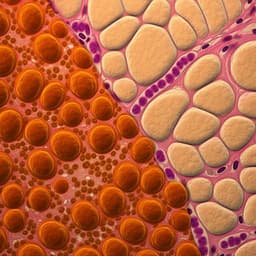
Health and Fitness
MyD88 determines the protective effects of fish oil and perilla oil against metabolic disorders and inflammation in adipose tissue from mice fed a high-fat diet
F. Wang, M. Hu, et al.
Discover how fish oil and perilla oil compare in combating metabolic disorders and inflammation in mice. This innovative study by Feng Wang, Mingyuan Hu, Hangju Zhu, Chao Yang, Hui Xia, Xian Yang, Ligang Yang, and Guiju Sun reveals that plant-based ω-3 PUFAs are a promising alternative to marine sources. Dive into the findings that could change dietary recommendations!
Related Publications
Explore these studies to deepen your understanding of the subject.







